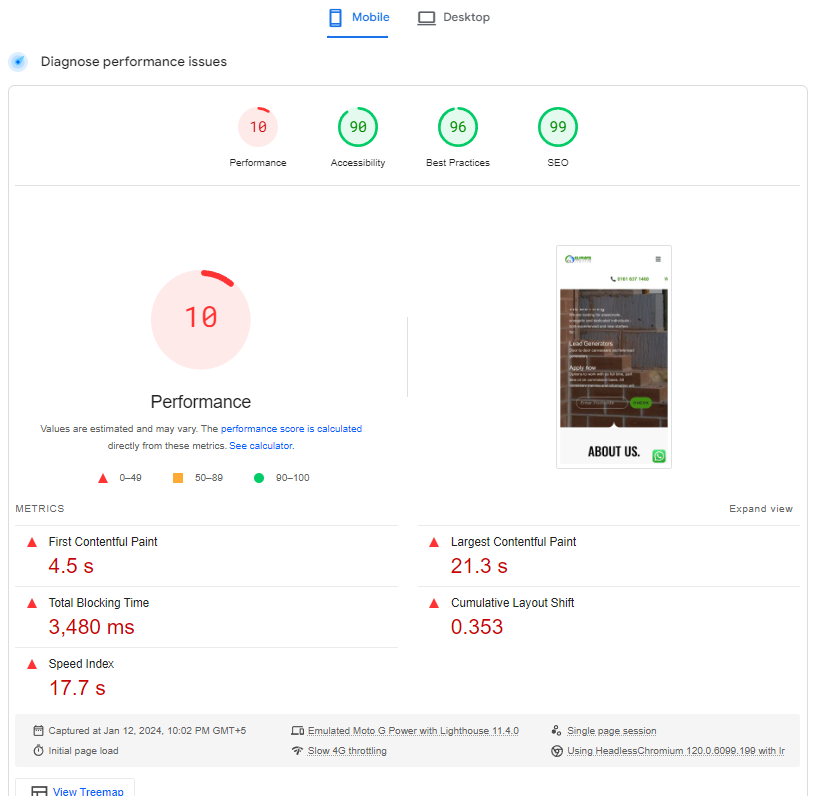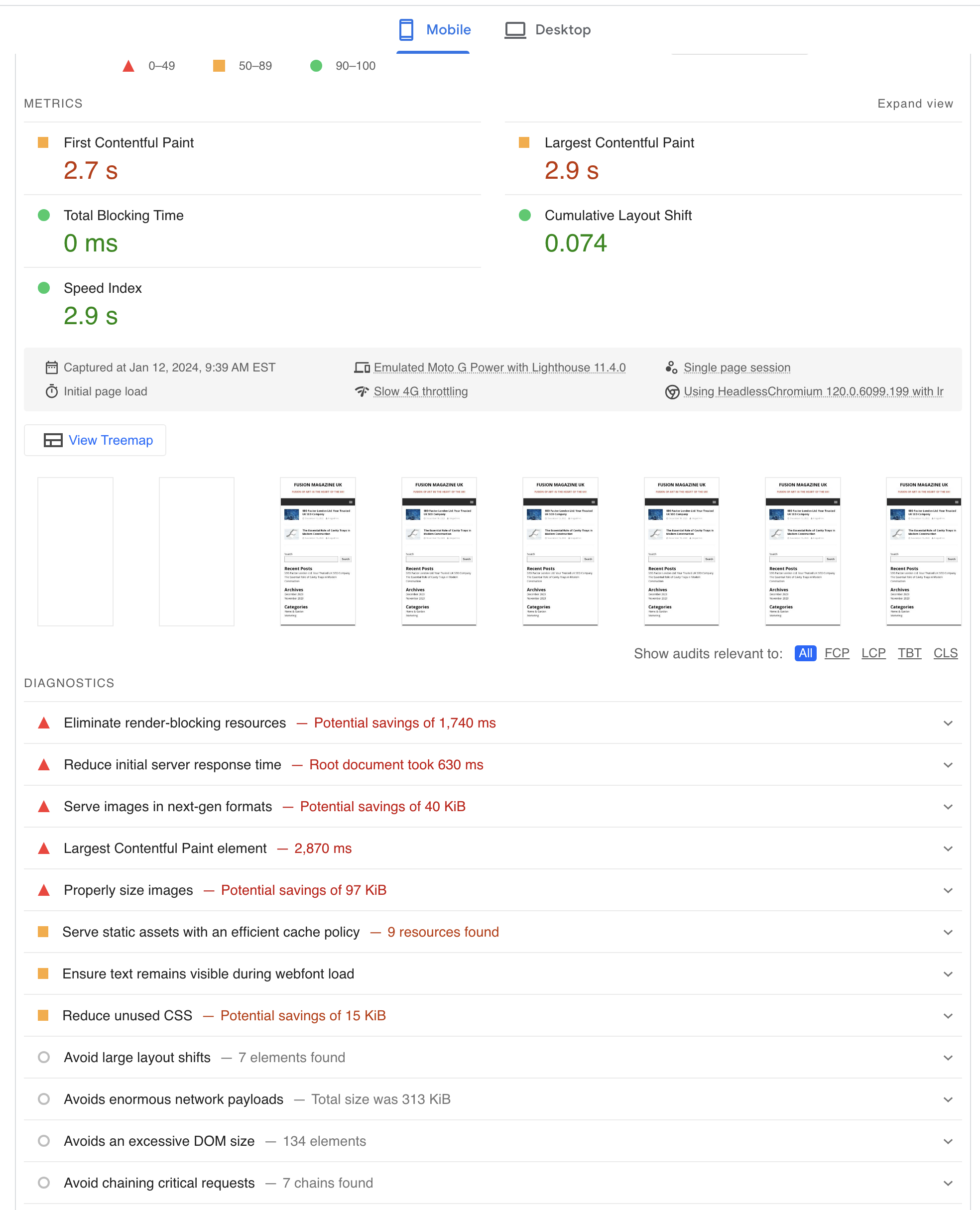Moz Q&A is closed.
After more than 13 years, and tens of thousands of questions, Moz Q&A closed on 12th December 2024. Whilst we’re not completely removing the content - many posts will still be possible to view - we have locked both new posts and new replies. More details here.
How to Boost Your WordPress Website Speed to 95+ (Without Premium Plugins)
-
I'm reaching out for some advice on improving my WordPress website's speed. I'm currently using a free theme for this fusion magazine and aiming for a score of 95+ on Google PageSpeed Insights. I'm aware that premium plugins can significantly enhance performance, but I'm hoping to achieve similar results using primarily free solutions and manual optimizations.
-
Optimize Images: Compress and resize images to reduce their file size, improving page load times. Tools like TinyPNG or WP's built-in options can help achieve this.
Leverage Browser Caching: Configure browser caching through your .htaccess file or a free caching plugin to store static resources locally in users' browsers, decreasing load times for returning visitors.
Minify CSS, JavaScript, and HTML: Remove unnecessary code and whitespace from your website's files. This can be done using free plugins or by manually editing the files to enhance performance.
For comprehensive improvements, consider utilizing professional WordPress Development Services to tailor optimizations specific to your site's needs.
-
Use LiteSpeed cache free version for speed optimization. Upload images in webp format. If possible, host images on a subdomain. Could you check this website as a sample?
-
@mohammadrehanseo Hello Friend!
In my observation and results now I only use the LiteSpeed cache plugin to increase the speed as LiteSpeed cache plugin has updated its features and more user-friendly interface you have to choose the pre-written template to increase the speed you can check one by one all the template to increase speed. I have increased my speed from 55 to 99 on my two websites you can check them if you want and you can also take my help if you want here these are my two websiteThis is one of the most easy method to increase the speed I have ever used
-
@mohammadrehanseo I am eager to tell you that WordPress speed optimization is my profession. So you may just focus on this list and forget about the rest. You should consider the following:
- HTML caching on the CDN (not only the host)
- Redesign or rethink about the main thread of work (JavaScript execution)
- rearrange the ATF objects and dont lazy load if image or video and don't use web fonts if paragraph or any kind of text.
- Extract the Critical Path CSS style definitions and put it into the head section and request for the rest as a separate external CSS file
- configure asset caching
You may find some other useful tips on WordPress Speed Optimization page on Stack Exchange
-
For boosting your WordPress site's speed, especially for a site like whatsgb, focusing on optimizing images, leveraging caching, and minimizing plugins can make a big difference. Consider using a lightweight theme and ensure your hosting provider is optimized for WordPress. These steps, combined with careful optimization, can lead to significant improvements without solely relying on premium plugins.
-
Please look at my website, there is no way to achieve a result of more than 45. (((
-
the process of boosting you WordPress website speed is first to optimize your images, CSS files and clear the caches of your website
-
Choose a fast hosting provider with SSD storage.
Use a lightweight theme and delete unused plugins.
Compress images and use lazy loading.
Set browser caching and use caching plugins.
Minify CSS and JavaScript files.
Use a CDN like Cloudflare.
Optimize the database and enable GZIP compression.
Address server response time issues.
Optimize the homepage and landing pages.
Use Google PageSpeed Insights for analysis. -
Hi,
I am sharing my experience of boosting the WordPress website. If you will follow my suggestions then you will be boost your website speed. Wp rocket is the best plugin for optimizing the website speed.
So sit on Gazebos take your laptop and work on your WordPress website and boost up. -
Great tips! Improving WordPress speed without premium plugins is a game-changer. Your guide provides practical insights for optimizing performance, making it accessible to all. Website globalfist.com speed is crucial for user experience and SEO, and your suggestions offer a valuable solution for WordPress users. Thanks for sharing these effective strategies!
-
I tried very hard to work on climateretrofit.co.uk for page speed especially by minimizing the and using webp images but still performance is very very bad and webpage loading time is very high. Additionally DA is very low, i am working on this website almost from 2 years but still not very satisfied. What should I do?


-
@mohammadrehanseo I just analyzed your site:

Desktop score is OK, mobile one needs some work.
Here is what I would do based on my optimization experience and what PageSpeed Insights for your site are suggesting:
- Install a free caching plugin, I've heard a free module Cache Enabled from KeyCDN is OK, just google for alternatives
- Move Javascript to the bottom to improve Start Render Time, there are free plugins for it
- Convert images to WebP and AVIF formats for lower weight. Use picture HTML5 tag to fallback to png or jpeg for browsers that don't support WebP/AVIF
- Use bigger TTL (about a year) for static content
-
@mohammadrehanseo You can use the LiteSpeed cache free plugin for speed optimization and no need to buy premium. I am also using it on a site FIFA 23 for Android and it's working well.
-
@mohammadrehanseo
<a href="faisalmover.com.pk">faisal movers</a> Please guide me.
Got a burning SEO question?
Subscribe to Moz Pro to gain full access to Q&A, answer questions, and ask your own.
Browse Questions
Explore more categories
-
Moz Tools
Chat with the community about the Moz tools.
-
SEO Tactics
Discuss the SEO process with fellow marketers
-
Community
Discuss industry events, jobs, and news!
-
Digital Marketing
Chat about tactics outside of SEO
-
Research & Trends
Dive into research and trends in the search industry.
-
Support
Connect on product support and feature requests.
Related Questions
-
Moz API Spam Score - Backlinks
Hi, everyone I am trying to get my website DA up. I have analyzed my competitors and thanks to Moz I have idea and insights of how my competitors get backlinks. But, some of them are old school techniques. Also my website has some PBNs no follow backlinks does it affect my website ranking? Their spam score is 10-40. But other competitors has them as well. Does anyone know indepth on this topic?
Link Building | | RejinKayastha1 -
Unsolved Need Moz SEO Wordpress Plugin With API
Re: Moz WordPress Plugin? Hi guys,
Moz Pro | | mrezair
I need some Moz SEO Wordpress Plugins For my website working with Moz API. I've already found Moz DA-PA Checker plugin Moz DA-PA Checker But Need SEO Plugins too. Any Suggestion will be appreciated.0 -
My website is constantly decreasing
For few weeks ago my website is constantly decreasing in search position. I lost keywords and is gooooing down.
Technical SEO | | Dan_Tala
Although it is well rated on several on page and off page seo verification software that I have tried.
I checked Google search console and Analytics and found no major problems. However… from one day to another it keeps going down.
I also checked what the main competitors are doing and they are not doing well, at all.
The main competitor actually has a creepy website. Totally devoid of onpage or offpage SEO but with an enormous number of backlinks. And of a very bad quality, which should disqualify it, still…
Few weeks ago I changed something.
In the pages I had H1, 4xH2, no H3 and an H4 without content.
An unnatural H tag structure.
Now I have H1, H2, H3, 3xH4, with the coherent information.
Theoretically, Google should have been “happy” or I’m missing something. I use a SAAS platform.
I just found out that they made changes to the keywords (tags).
I am selling toner cartridges for printers.
So…
The tags are printer models and generate a url in which they have the products.
Ex. https://www.sertit.ro/cartus-imprimanta-cilindru-color-hp-laserjet-pro-m-177fw goes to the products for that printer model.
The question is… should I make tag canonical?
Is it possible for products to loose so much in Google search?0 -
Unsolved Duplicate LocalBusiness Schema Markup
Hello! I've been having a hard time finding an answer to this specific question so I figured I'd drop it here. I always add custom LocalBusiness markup to clients' homepages, but sometimes the client's website provider will include their own automated LocalBusiness markup. The codes I create often include more information. Assuming the website provider is unwilling to remove their markup, is it a bad idea to include my code as well? It seems like it could potentially be read as spammy by Google. Do the pros of having more detailed markup outweigh that potential negative impact?
Local Website Optimization | | GoogleAlgoServant0 -
Solved How to solve orphan pages on a job board
Working on a website that has a job board, and over 4000 active job ads. All of these ads are listed on a single "job board" page, and don’t obviously all load at the same time. They are not linked to from anywhere else, so all tools are listing all of these job ad pages as orphans. How much of a red flag are these orphan pages? Do sites like Indeed have this same issue? Their job ads are completely dynamic, how are these pages then indexed? We use Google’s Search API to handle any expired jobs, so they are not the issue. It’s the active, but orphaned pages we are looking to solve. The site is hosted on WordPress. What is the best way to solve this issue? Just create a job category page and link to each individual job ad from there? Any simpler and perhaps more obvious solutions? What does the website structure need to be like for the problem to be solved? Would appreciate any advice you can share!
Reporting & Analytics | | Michael_M2 -
Barba Plugin and SEO
Hello, community! My client wants to use the barba.js plugin for their new site. What are the implications for SEO?
Technical SEO | | SimpleSearch0 -
Non Published Wordpress Pages
Hi, Is there any negative SEO consequences from having too many pages private or not published. Can it like slow the site down or does it not matter? Someone in my dept. has so many pages started/not complete and besides being messy, I wonder if it has any negative impact on the site. Thanks
Technical SEO | | aua1